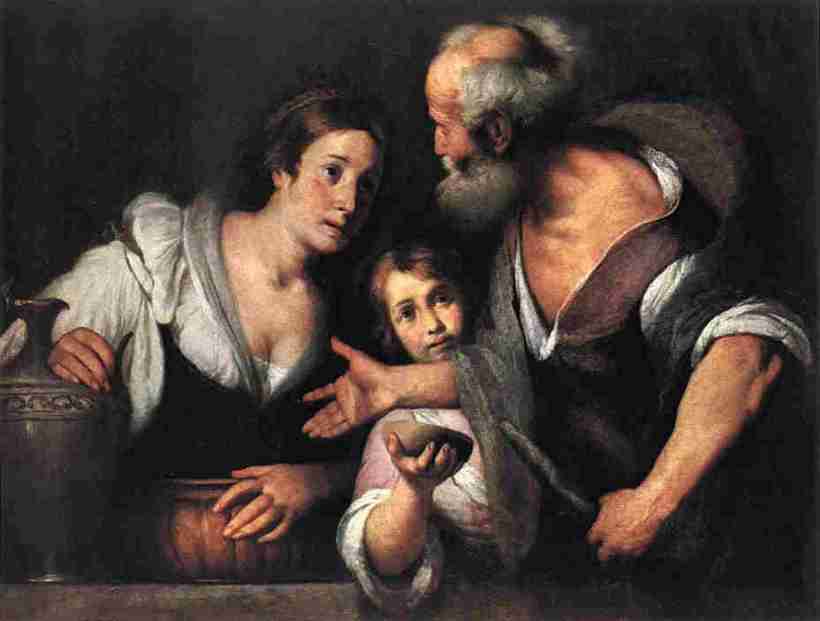The poor widow. She attracted no attention. But the Lord Jesus did not consider her a non-person. He measured her not by her wealth, nor by the extent of her entourage, nor by her influence over the affairs of this world. He measured her by the only criterion that ultimately matters: by the sincerity of her love for God and neighbor. [Spanish]
Every human being is a person: someone who can love and do good and become a heroic saint. A Christian has to see all people this way, penetrating beyond the outer veil of worldly considerations and finding the truth that will last beyond the grave.
What makes abortion so scandalously evil? It treats the unborn child as a non-person. What makes racism and xenophobia so scandalously evil? The immigrant, the non-English-speaker, the desperate refugee: non-person. What’s so horribly scandalous about an angry menace going into a synagogue, or a church, or a mall, or a dancehall–and shooting indiscriminately? The shooter thinks of these people as non-persons.
Tonight we mark the eightieth anniversary of Kristallnacht in Germany, the beginning of the Holocaust. Why is the Holocaust such a shameful stain on the history of humanity? Because the Nazis regarded the Jews as non-persons.
Now, this next step will prove painful and difficult for us to get through. But we have to. What is the unending Catholic Clergy Sex-Abuse Scandal about? Isn’t it fundamentally about the systematic treatment of particular vulnerable human beings as non-persons?
Last February a brave man in Buffalo, New York, publicly denounced a priest who had abused him decades earlier, but who had never faced public justice. And just last week, we learned that a man in New York City had summoned the clarity and courage to accuse a bishop of the same.
In both these cases–as in so, so, so many others–the abusing priests treated these teenage boys as non-persons. Instead of respecting the child of God–with a conscience, with ambitions and dreams for the future; instead of seeing this person, the abusing clergyman saw only a prop for use in his own desperate, twisted escapade; he saw an implement for satisfying his own evil appetites.
Now, this kind of abuse would scandalize us plenty, in and of itself. But the abusers were not the only ones who treated these young men (and, in about 20% of the cases, young women) as non-persons. So did the entire authority structure of the Church. For decades.
Over the past nine months, many secret Church records have finally come to light. What do they show? –The records that will continue to come out, as investigations all over the country run their course: What will they show?
That the Church as an institution has not respected sex-abuse victims as persons. The abusers saw them only as props for pleasure. And way too often, the bishops saw them only as public nuisances and legal liabilities.
Now, in this fallen world of ours, we have to face the sad fact: people treat each other as non-persons all the time. We disrespect each other, use each other. That’s what sinning against your neighbor usually involves.
But when we sinners realize that we have done this, we’re sorry. We apologize. We try to heal the harm done. We heal disrespect, de-humanization, non-personhood. With respect, humane treatment, personal attention.
And as common as it may be for us sinners to treat each other as non-persons, that doesn’t change this fact: Whenever a Christian clergyman treats a fellow human being as a non-person, it does deep damage. It compromises the integrity of the one institution that Jesus Christ founded to propagate His Gospel. The Gospel of the personal dignity of every human being. The Gospel of Almighty God’s fatherly love.
The soul-crushing fact of the Catholic Clergy Sex Abuse Scandal is this: whistleblowers and Attorneys General have pulled back the curtain to reveal the “wizard.” And we see that the whole authority structure of the Church has treated sex-abuse victims as non-persons. Consistently, for decades, despite numerous promises to the contrary.
Bishops here and there have actually done heroically beautiful things to try to deal with this problem. But the hierarchy of the Church, considered as a whole, has shown no real interest in truly redressing the wrong done. Instead, over and over again, the same question has dominated the minds of bishops, Cardinals, popes: Quick! What rug can we sweep this under?
Now, that begs the question. What would real redress for sexual abuse involve? Tough question to answer. Except: There is always one expert who knows. Namely, the person who suffered the abuse.
What will make things right for you? What could restore your faith in God, and His Church? What can heal your soul? What will make it possible for you to turn a corner?
The person who has suffered has the one right answer. No ‘policy’ will ever solve this scandal, because every case involves specific human beings. The Scandal will end when the pope and the bishops ask the victims these questions personally–in each and every case–and actually listen to the answers.


 We owe God our religion. We owe Him worship and honor, our acknowledgement of how immeasurably greater He is than we are. God transcends all time and space; His wisdom excels the intelligence of any human mind. We use our little minds to try to govern as wisely as we can the things that we can control. Meanwhile, we recognize with faith that God alone governs all things.
We owe God our religion. We owe Him worship and honor, our acknowledgement of how immeasurably greater He is than we are. God transcends all time and space; His wisdom excels the intelligence of any human mind. We use our little minds to try to govern as wisely as we can the things that we can control. Meanwhile, we recognize with faith that God alone governs all things. Later this week I will head north to attend my 25th college reunion. They call us Generation X.
Later this week I will head north to attend my 25th college reunion. They call us Generation X. Cynical. But, listen: You don’t have to be old to think that the resurrection is important, and no laughing matter. The toils and ordeals of this pilgrimage will make anyone cynical—unless we keep ourselves focused on our eternal destiny.
Cynical. But, listen: You don’t have to be old to think that the resurrection is important, and no laughing matter. The toils and ordeals of this pilgrimage will make anyone cynical—unless we keep ourselves focused on our eternal destiny.
 But Elijah said: Faith is the substance of things hoped for. Faith is a “substance.”
But Elijah said: Faith is the substance of things hoped for. Faith is a “substance.” Elijah did not start with a sermon; he demanded a cake. The woman was also practical and no-nonsense. But did she respond to Elijah’s purely practical request with pure pragmatism of her own?
Elijah did not start with a sermon; he demanded a cake. The woman was also practical and no-nonsense. But did she respond to Elijah’s purely practical request with pure pragmatism of her own?
 And, of course, these days Rome is abuzz with talk about how the next pope, whoever he will be, must be prepared to execute this New Evangelization.
And, of course, these days Rome is abuzz with talk about how the next pope, whoever he will be, must be prepared to execute this New Evangelization. Serving any god other than the real God estranges any human being from himself, not just a Jew.
Serving any god other than the real God estranges any human being from himself, not just a Jew.